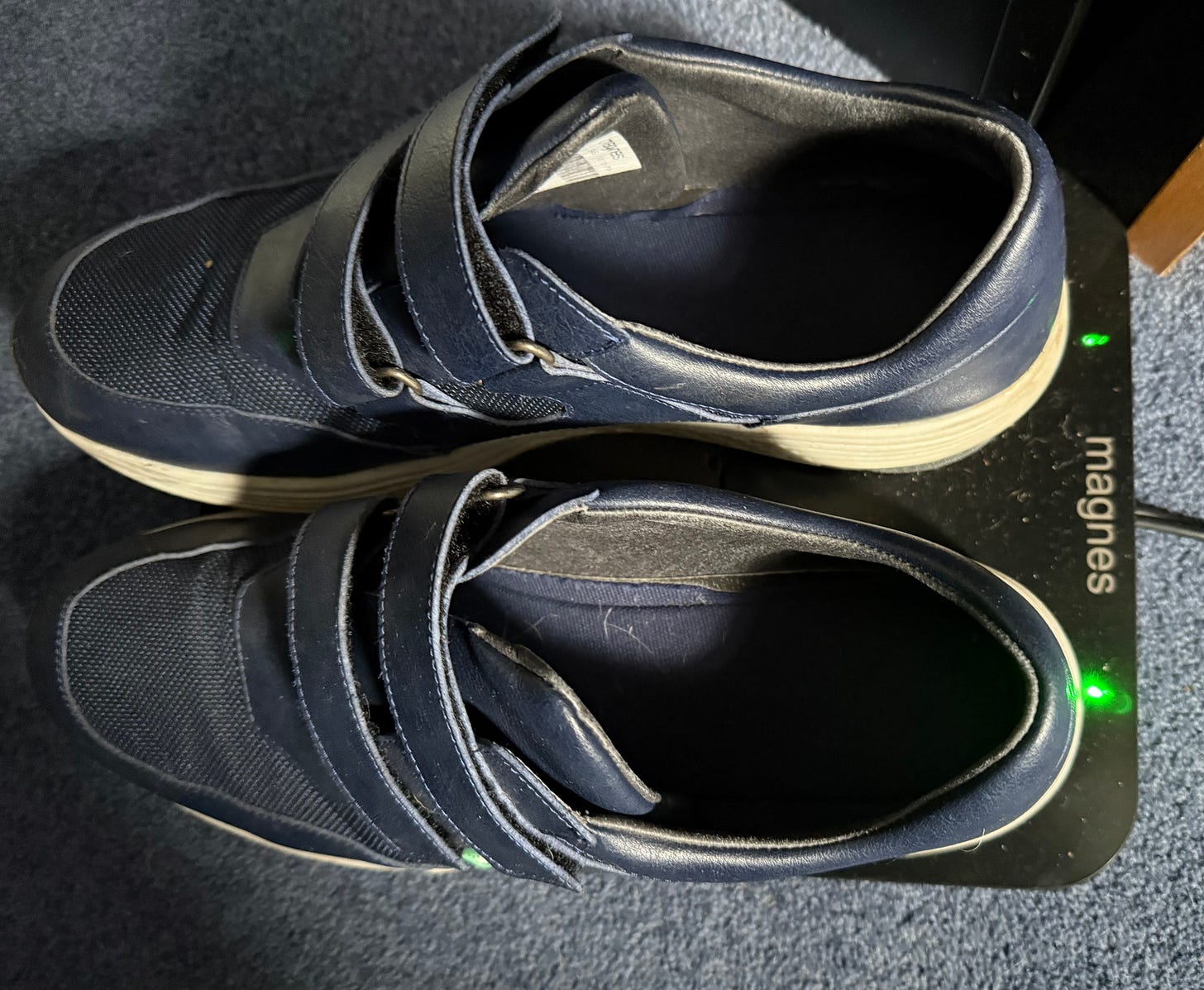As a former tech correspondent, I still get a thrill when I get my hands on a hot new gadget - though I have to remind myself that for every startling innovation like the iPhone there will be dozens of duds. So researching this week’s episode of Movers and Shakers which looks at the latest technology aimed at people with Parkinson’s was a joy. There were two remarkable gadgets to try out - and we had invited along the editor of Parkinson’s UK’s new technology guide to give us an objective view of what is now on offer.
Our first gadget looks just like a normal pair of shoes - in fact that is what the NUSHU X is, and I have been wearing them for the past couple of months. But what is different about them is the small device in each sole which measures the way the user walks with extreme accuracy. The shoes have two functions - they allow doctors to assess a patient’s Parkinson’s symptoms and how they progress over time, and by sending an electrical pulse through the heel of the shoe, the claim is that they can help alleviate problems with walking.
George Chatzipirpiridis from Magnes, the Swiss firm behind the shoes, explains that the way we walk reveals a lot about the health of our brains:
"If somebody is depressed or if somebody's happy, they walk differently. And when it comes to Parkinson's, there you can use this information to see how well someone responds to medication.” The company has persuaded a number of Swiss clinics to invest in the shoes in a range of sizes - the idea is that instead of assessing patients by watching them walk back and forth along a hospital corridor, the doctor will get a. mass of data from the shoes, giving them a far more precise view.
The selling point for individual purchasers of the NUSHU X is that the vibration in the shoes can signal to the user where and when to put their feet down. The claim is that this can help improve the gait of those who have balance problems or people who freeze and can’t get through a door.
The problem is that the high cost of the shoes - roughly £1500 a pair - means that NHS hospitals and NICE are unlikely to see them as value for money and only a few wealthy individuals may be tempted to give them a go.
Our second gadget is at the other end of the price spectrum. The Beech Band, invented by Carl Beech, is going to retail for around £30 - but then it is very simple, just a bracelet which vibrates at a fixed tempo. But what Carl shows us when he sits down in the pub with us has us gasping in amazement.
Carl, whose very busy life includes being chief executive of the charity Spotlight YOPD, was diagnosed with Parkinson’s two years ago at the age of 51. He tells us that his life revolves around public speaking - he is an evangelical Christian and was a pastor for some years - so the rapid degradation of his voice after the diagnosis was a bitter blow.
But he had heard a bit about the concept of ‘cueing’, sending physical, visual or audio signals to the brain to improve both gait and speech. So he started tapping his chest as he spoke and found that at a certain number of beats per minute (he says he’s keeping the precise figure secret like the recipe for Coca Cola) magical things occurred. His speech became clearer, both in terms of how he sounded and what he said. The Beech Band is designed to produce the same effect, without the user having to tap their chest.
Carl had deliberately held back from taking his medication before coming to the pub so his symptoms were more pronounced. When he starts speaking, he sounds painfully disjointed and we struggle to understand him. Then he switches on his Beech Band and within seconds his speech is transformed - to such an extent that you can hear Paul Mayhew-Archer saying “oh my God!”
Carl says discovering this technique has changed his life:
“I remember the man I was before I got Parkinson's, and it's like I've come alive, like I've come out from a fog. It's really quite powerful.”
Now, sceptics will ask whether Carl has tricked himself into believing this works - a placebo effect - so it is effective for him, but won’t be for others. He says he has now successfully demonstrated it to dozens of doctors and their patients but accepts that only proper clinical trials can prove that he has discovered something groundbreaking:
“I know that until it's proven in the clinical environment it's a theory. But the thing is, doctors are now starting to recommend it because they actually know it works.”
There are dozens of gadgets like the Beech Band and NUSHU X but it is very difficult for people with Parkinson’s to assess whether they are effective before spending what can be quite sizeable sums on them. Our final guest has taken on the challenge of guiding consumers through this confusing landscape.
John Pettigrew is the editor of Parkinson’s UK’s Tech Guide, a kind of ‘Which?’ for Parky gadgets. He explain’s what it is for:
“The Tech Guide’s purpose is to try and help people discover what's out there, but to understand what it offers, whether it's something they should be trusting, based on the science, based on the experience of other people with Parkinson's.’
Launched last autumn, the guide looks a bit thin at the moment, with very basic information about each product. But gradually, in-depth reviews carried out by a panel of people with Parkinson’s are being rolled out. This a major undertaking: “Each of these reviews takes three months,” John Pettigrew explains. “It involves six people with Parkinson's living with the device or the app for a month.”
So far, the reviewers have often been underwhelmed by the gadgets they have tried, although some devices have ardent fans as well as sceptics. With Parkinson’s having so many symptoms and each person’s experience of the disease being different, it is hard to imagine that there will be many products that will be suitable for everyone. So while it is heartening to see that innovators and entrepreneurs are coming up with idea like the NUSHU X and the Beech Band, it is reassuring that someone is casting a rigorous eye over their claims.





Sounds and looks amazing. I’ve had Parkinsons for 11 years. Have had dbs but my voice is frail and I swallow words. I will be ordering a beech band as soon as they are available in Australia. In fact we’d love to market them here in Australia. Thank you
Lots of research in the music therapy world would suggest that Carl is right. It should also help with walking. Read Daniel Levitin Your Brain on Music to learn more. Great piece of affordable tech. Thank you